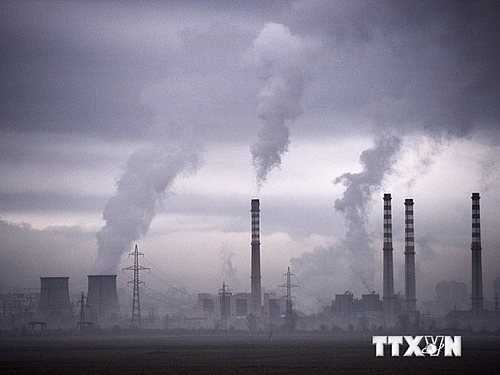New study shows global carbon emissions dropped 17 per cent due to COVID-19 crisis
 |
| The study also found that in individual countries, emissions decreased by 26 per cent on average at the peak of their confinement amid COVID-19 (Photo: TTXVN) |
The study was led by the University of East Anglia (UEA), one of the Top 25 universities in the UK and also a leading member of Norwich Research Park, one of Europe’s biggest research institutes.
The new study published in the journal Nature Climate Change shows that daily emissions decreased by 17 per cent – or 17 million tonnes of CO2 – globally during the peak of the confinement measures in early April, compared to mean daily levels in 2019, dropping to levels last observed in 2006.
Emissions from surface transport, such as car journeys, accounted for almost half (43 per cent) of the decrease in global emissions during peak confinement on April 7. Emissions from industry and the power sector together accounted for a further 43 per cent of the decrease in daily global emissions.
Aviation is the economic sector most impacted by the lockdown, but it only accounts for 3 per cent of global emissions, or 10 per cent of the decrease in emissions during the pandemic.
The increase in the use of residential buildings from people working at home only marginally offset the drop in emissions from other sectors.
The study found that in individual countries, emissions decreased by 26 per cent on average at the peak of their confinement.
The analysis also shows that social responses alone, without increases in wellbeing and supporting infrastructure, will not drive the deep and sustained reductions needed to reach net zero emissions.
| The analysis also shows that social responses alone, without increases in wellbeing and supporting infrastructure, will not drive the deep and sustained reductions needed to reach net zero emissions. |
Prof. Corinne Le Quéré at UEA, who led the analysis, said, “Population confinement has led to drastic changes in energy use and CO2 emissions. These extreme decreases are likely to be temporary though, as they do not reflect structural changes in the economic, transport, or energy systems."
“The extent to which world leaders consider climate change when planning their economic responses post-COVID-19 will influence the global CO2 emissions paths for decades to come,” the professor added.
In her words, there are opportunities to make real, durable changes and be more resilient to future crises by implementing economic stimulus packages that also help meet climate targets, especially for mobility, which accounts for half the decrease in emissions during confinement.
“For example in cities and suburbs, supporting walking and cycling, and the uptake of electric bikes, is far cheaper and better for wellbeing and air quality than building roads, and it preserves social distancing,” said the professor.
The team analysed government policies on confinement at 69 countries responsible for 97 per cent of global CO2 emissions. At the peak of the confinement, regions responsible for 89 per cent of global CO2 emissions were under some level of restriction.
Data on activities indicative of how much each economic sector was affected by the pandemic was then used to estimate the change in CO2 emissions for each day and country from January to April 2020.
The estimated total change in emissions from the pandemic amounts to 1,048 million tonnes of carbon dioxide (MtCO2) until the end of April. Of this, the changes are largest in China where the confinement started, with a decrease of 242 MtCO2, then in the US (207 MtCO2), Europe (123 MtCO2), and India (98 MtCO2).
The impact of confinement on 2020 annual emissions is projected to be around 4 to 7 per cent compared to 2019, depending on the duration of the lockdown and the extent of the recovery.
If pre-pandemic conditions of mobility and economic activity return by mid-June, the decline would be around 4 per cent. If some restrictions remain worldwide until the end of the year, it would be around 7 per cent.
This annual drop is comparable to the amount of annual emissions reductions needed each year across decades to achieve the climate objectives of the UN Paris Agreement.
Prof. Rob Jackson of Stanford University and chair of the Global Carbon Project, who co-authored the analysis, added, “The drop in emissions is substantial but illustrates the challenge of reaching our Paris climate commitments. We need systemic change through green energy and electric cars, not temporary reductions from enforced behaviour."
The Global Carbon Project is an international research project within the Future Earth research initiative on global sustainability. It aims to develop a complete picture of the global carbon cycle, including both its biophysical and human dimensions together with the interactions and feedbacks between them.
What the stars mean:
★ Poor ★ ★ Promising ★★★ Good ★★★★ Very good ★★★★★ Exceptional
Related Contents
Latest News
More News
- Masan Consumer names new deputy CEO to drive foods and beverages growth (February 23, 2026 | 20:52)
- Myriad risks ahead, but ones Vietnam can confront (February 20, 2026 | 15:02)
- Vietnam making the leap into AI and semiconductors (February 20, 2026 | 09:37)
- Funding must be activated for semiconductor success (February 20, 2026 | 09:20)
- Resilience as new benchmark for smarter infrastructure (February 19, 2026 | 20:35)
- A golden time to shine within ASEAN (February 19, 2026 | 20:22)
- Vietnam’s pivotal year for advancing sustainability (February 19, 2026 | 08:44)
- Strengthening the core role of industry and trade (February 19, 2026 | 08:35)
- Future orientations for healthcare improvements (February 19, 2026 | 08:29)
- Infrastructure orientations suitable for a new chapter (February 19, 2026 | 08:15)

 Tag:
Tag:

























 Mobile Version
Mobile Version